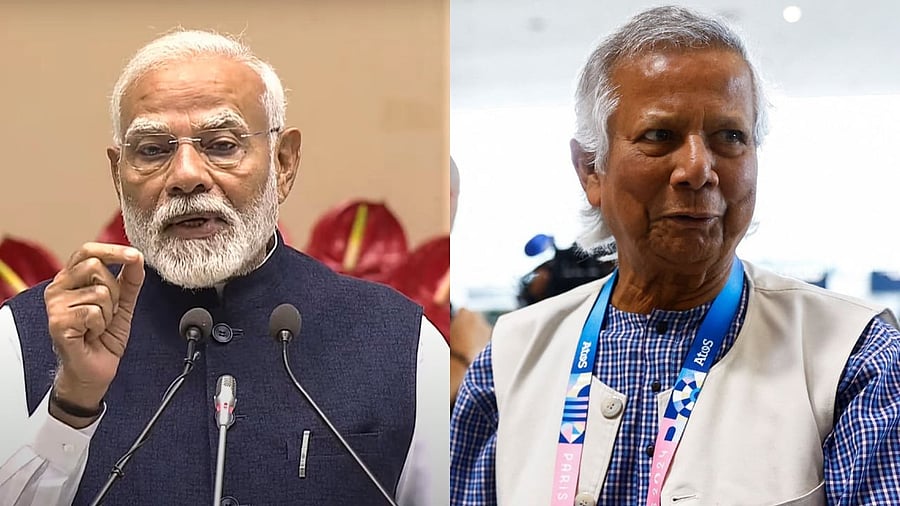
PM Modi (L) and Muhammad Yunus (R).
Credit: PTI, Reuters Photos
New Delhi: The spirit of the 1971 Liberation War continues to be the guiding light for New Delhi’s relations with Dhaka, Prime Minister Narendra Modi wrote to his counterpart, Muhammad Yunus, the chief advisor of the interim government of Bangladesh, greeting him on the occasion of the Independence Day of the eastern neighbour of India.
“The spirit of the Liberation War of Bangladesh continues to remain a guiding light for our relationship, which has flourished across multiple domains, bringing tangible benefits to our peoples,” Modi wrote to Yunus. “We remain committed to advancing this partnership, driven by our common aspirations for peace, stability, and prosperity, and based on mutual sensitivity to each other's interests and concerns”.
The relation between New Delhi and Dhaka came under stress following the collapse of Sheikh Hasina’s Awami League government in Bangladesh on August 5, 2024, in the wake of widespread protests against the crackdown on the agitation by students and youths demanding the end of the reservation in recruitment to government jobs.
Modi’s reference to the Liberation War of 1971 on Wednesday appears to be a subtle message from New Delhi to Yunus and his interim government in Dhaka, as well as to a section of the students and youths and the anti-India radical elements in Bangladesh.
The Indian Army had in 1971 helped the ‘Muktijoddhas’ or the ‘Liberation Warriors’ of East Pakistan to defeat the Pakistan Army and carve out the independent Bangladesh.
Bangabandhu Sheikh Mujibur Rahman had on March 26, 1971, had declared the independence of Bangladesh from Pakistan, leading to the war, which had given birth to the new nation.
The prime minister referred to the 1971 ‘Liberation War’ to subtly remind Bangladesh about India’s role in the creation of the new nation. The move came amid attempts in Bangladesh to erase the history of Bangabandhu Sheikh Mujibur Rahman’s role in the fight against the repressive Pakistan Army and a campaign against India.
Yunus took over as the chief advisor of an interim government in Bangladesh after Hasina flew to India in the wake of the mass protest.
India’s protest against the persecution of Hindus and other minority communities in Bangladesh after the change of government in the neighbouring nation, India’s silence over the request by the interim government of Bangladesh for extradition of Sheikh Hasina or its protest against her virtual addresses delivered from India on recent developments in Bangladesh, including the vandalism and demolition of the historic residence of her father and the founder of the nation Bangabandhu Sheikh Mujibur Rahman, emerged as irritants in the bilateral relations.
"India-Bangladesh relations are multi-faceted, with our cooperation encompassing diverse areas such as trade, multimodal connectivity, development partnership, power and energy, education, capacity building, cultural cooperation and people-to-people exchanges. Bangladesh is at the focus of India's "Neighbourhood First" and "Act East" policies, our SAGAR doctrine and the Indo-Pacific Vision. India reiterates its support for a democratic, stable, inclusive, peaceful and progressive Bangladesh," President Draupadi Murmu said in her message to her counterpart Mohammed Shahabuddin.
